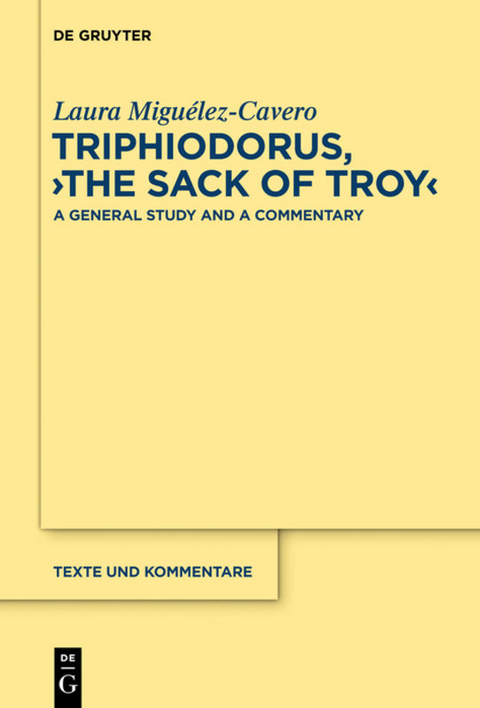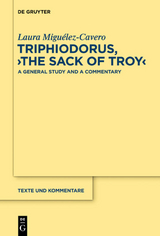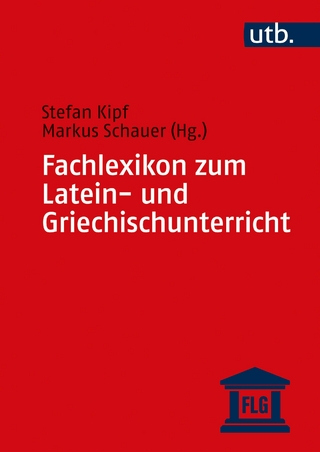Triphiodorus, "The Sack of Troy"
A General Study and a Commentary
Seiten
2013
De Gruyter (Verlag)
978-3-11-028520-8 (ISBN)
De Gruyter (Verlag)
978-3-11-028520-8 (ISBN)
In der Reihe werden wichtige Neuausgaben und Kommentare zu Texten der griechisch-römischen Antike publiziert, insbesondere kommentierte Ausgaben nur fragmentarisch überlieferter Texte. Ihrem umfassenden Charakter entsprechend leistet die Reihe einen wesentlichen Beitrag zur Erschließung der antiken Literatur.
The last full commentary on The Sack of Troy was published by Wernicke in 1819 and even the most recent analyses of the poem tend to see it as a quick halt in the evolution of epic poetry on its way towards Nonnus of Panopolis. This book offers a complete treatment of The Sack of Troy for its own sake. The introduction gathers all the information we have about Triphiodorus and his work, focusing on the reasons behind the election of topic, the outline of the poem, different forms of allusion, the use of the characterisation of individuals and groups to sustain plot development, the nature of the narrator and the value of speeches. This part is followed by a detailed analysis of Triphiodorus’ literary universe: his different forms of engagement not only with Homer and other distant poets, but also with Imperial literature and the contemporary cultural production. The line-by-line commentary of the poem attends to the position of each episode in the poem and in the tradition of the Trojan War and offers a linguistic, formal and stylistic analysis. Each section or episode is preceded by a comprehensive introduction, always bringing in all the related bibliography but providing a fresh and reliable view on Triphiodorus.
The last full commentary on The Sack of Troy was published by Wernicke in 1819 and even the most recent analyses of the poem tend to see it as a quick halt in the evolution of epic poetry on its way towards Nonnus of Panopolis. This book offers a complete treatment of The Sack of Troy for its own sake. The introduction gathers all the information we have about Triphiodorus and his work, focusing on the reasons behind the election of topic, the outline of the poem, different forms of allusion, the use of the characterisation of individuals and groups to sustain plot development, the nature of the narrator and the value of speeches. This part is followed by a detailed analysis of Triphiodorus’ literary universe: his different forms of engagement not only with Homer and other distant poets, but also with Imperial literature and the contemporary cultural production. The line-by-line commentary of the poem attends to the position of each episode in the poem and in the tradition of the Trojan War and offers a linguistic, formal and stylistic analysis. Each section or episode is preceded by a comprehensive introduction, always bringing in all the related bibliography but providing a fresh and reliable view on Triphiodorus.
Laura Miguélez-Cavero, University of Salamanca,Spain.
"Kurzum: Laura Miguelez-Cavero hat mit ihrer Arbeit zur Iliou Halosis ein Standardwerk geschaffen, von dem die einschlagige Forschung noch sehr lange zehren wird; jeder, der sich mit spatgriechischer Epik, ja uberhaupt mit der griechischen Literatur der Kaiserzeit befasst, sollte das Buch griffbereit auf seinem Schreibtisch haben."
Silvio Bär in: Mnemosyne 68.4/2015
| Erscheint lt. Verlag | 30.10.2013 |
|---|---|
| Reihe/Serie | Texte und Kommentare ; 45 |
| Verlagsort | Berlin/Boston |
| Sprache | englisch; Greek, Ancient (to 1453) |
| Maße | 155 x 230 mm |
| Gewicht | 906 g |
| Themenwelt | Geisteswissenschaften ► Sprach- / Literaturwissenschaft ► Latein / Altgriechisch |
| Geisteswissenschaften ► Sprach- / Literaturwissenschaft ► Literaturwissenschaft | |
| Geisteswissenschaften ► Sprach- / Literaturwissenschaft ► Sprachwissenschaft | |
| Schlagworte | Griechenland (Alt-G.), Literatur • Homerisierende Dichtung • Homerising Poetry • Homerising Poetry; Late Greek Epic; Triphiodorus of Panopolis • Late Greek Epic • Spätgriechische Epik • Triphiodorus of Panopolis • Triphiodorus von Panopolis |
| ISBN-10 | 3-11-028520-7 / 3110285207 |
| ISBN-13 | 978-3-11-028520-8 / 9783110285208 |
| Zustand | Neuware |
| Haben Sie eine Frage zum Produkt? |
Mehr entdecken
aus dem Bereich
aus dem Bereich
kleines Lexikon deutscher Wörter lateinischer Herkunft
Buch | Softcover (2023)
C.H.Beck (Verlag)
CHF 20,95
Per Aspera ad Astra. Intensivkurs für Studierende zur Vorbereitung …
Buch | Softcover (2023)
Universitätsverlag Winter GmbH Heidelberg
CHF 32,15




